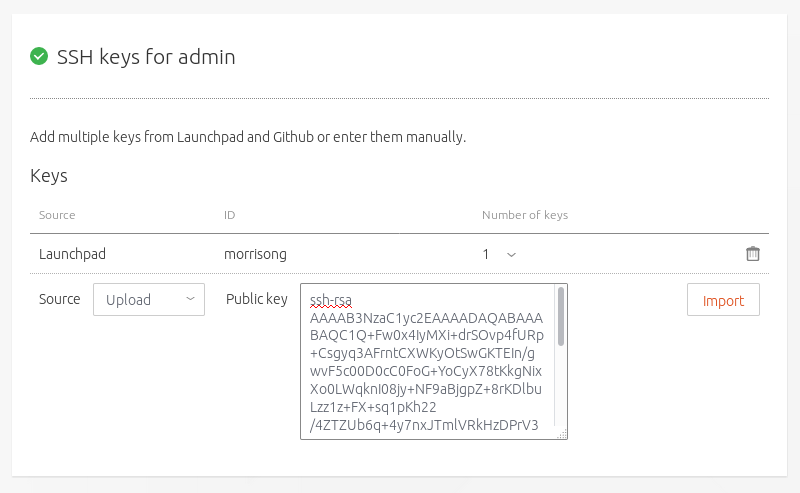
- Ubuntu Generate Ssh Key Github Pdf
- Ubuntu Generate Ssh Key Github Free
- Ubuntu Generate Ssh Key Github Free
title: Creating SSH Keys on Ubuntu Linux 16.04 LTSslug: ssh-keys-ubuntu-linuxmeta: Learn how to quickly generate new SSH keys on Ubuntu Linux 16.04 LTS.category: postdate: 2017-02-14modified: 2017-04-28newsletter: Falseheaderimage: /img/170214-ssh-keys-ubuntu/header.jpgheaderalt: Ubuntu Linux logo, copyright Canonical Ltd.
SSH keys are a necessity for Python development when you are working withGit, connecting to remote servers and automating yourdeployments. Let's walk through how to generate SSHkey pairs, which contain both a public and a private key within a singlepair, on Ubuntu Linux.
Generating the Public and Private Keys
Create SSH keys for Github. Depending on the operating system you are using, there are two ways of generating SSH keys for GitHub. Create SSH keys on Linux using ssh-keygen. First of all, let’s have a look at creating SSH keys on Linux operating systems. To create SSH keys on Linux, use the ssh-keygen command with a RSA algorithm (using the “-t” option). GitHub.com Authentication Connecting to GitHub with SSH Generating a new SSH key and adding it to the ssh-agent Generating a new SSH key and adding it to the ssh-agent After you've checked for existing SSH keys, you can generate a new SSH key to use for authentication, then add it to the ssh-agent. Oct 24, 2018 Ubuntu 18.04 Setup SSH Public Key Authentication. The procedure to set up secure ssh keys on Ubuntu 18.04: Create the key pair using ssh-keygen command. Copy and install the public key using ssh-copy-id command. Add yourself to sudo admin account on Ubuntu 18.04 server. Disable the password login for root account on Ubuntu 18.04.
Open up a new terminal window in Ubuntu like we see in the followingscreenshot.
The ssh-keygen command provides an interactive command line interface forgenerating both the public and private keys. Invoke ssh-keygen with thefollowing -t and -b arguments to ensure we get a 4096 bit RSA key.Optionally, you can also specify your email address with -C (otherwiseone will be generated off your current Linux account):
(Note: the -o option was introduced in 2014; if this command fails for you, simply remove the -o option)
The first prompt you will see asks where to save the key. However, there areactually two files that will be generated: the public key and the privatekey.

This prompt refers to the private key and whatever you enter will alsogenerate a second file for the public key that has the same name and .pubappended.
If you already have a key, you should specify a new filename. I use manySSH keys so I typically name them 'test-deploy', 'prod-deploy', 'ci-server'along with a unique project name. Naming is one of those hard computerscience problems, so take some time to come up with a system that works foryou and the development team you work with!

Next you will see a prompt for an optional passphrase:
Whether or not you want a passphrase depends on how you will use the key.The system will ask you for the passphrase whenever you use the SSH keyso it is more secure.However, if you are automating deployments with acontinuous integration server likeJenkins then you will not want a passphrase.
Be aware that it is impossible to recover a passphrase if it is lost. Keepthat passphrase safe and secure because otherwise a completely new key wouldhave to be generated.
Enter the passphrase (or just press enter to not have a passphrase) twice.You'll see some output like the following:
Your SSH key is now generated and ready to use!
What now?
Now that you have your public and private keys, I recommend settingup a Python development environment withone of the following tutorials so you can start coding:
Additional ssh-keygen command resources:
Ubuntu Generate Ssh Key Github Pdf
Questions? Contact me via Twitter@fullstackpythonor @mattmakai. I'm also on GitHub withthe username mattmakai.
See something wrong in this post? Forkthis page's source on GitHuband submit a pull request.
Mac and Linux
Ubuntu Generate Ssh Key Github Free
Open Terminal
Check if you already have a SSH keypair generated. Do the following:
If the files exist, you already have SSH installed. IMPORTANT: But if you wish to regenerate the SSH key pair, at least back up your old SSH keys.
Generate a 4096-bit key pair - yes, use the higher bit
Enter a file in which you want to save your keys. You can press enter and the default
~/.ssh/id_rsawill be used.Enter a passphrase. Read Github working with SSH key passphrase articule on why you should use a passphrase and at the same time you don't have to enter the passphase everytime you use your SSH key.
From here on your SSH key pair is generated, your SSH public key is
~/.ssh/id_rsa.pub- the one with thepubextension. BE EXTRA CAREFUL when using your~/.ssh/id_rsafile. This is your private key, guard it properly.
Windows
Ubuntu Generate Ssh Key Github Free
- Install Git for Windows
- Open Git Bash and repeat the above instructions